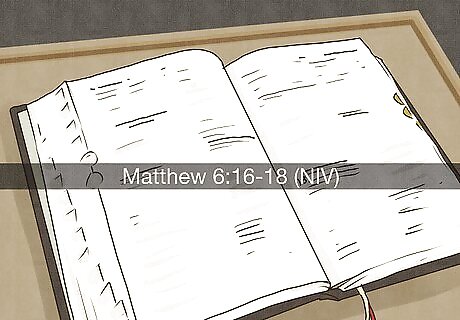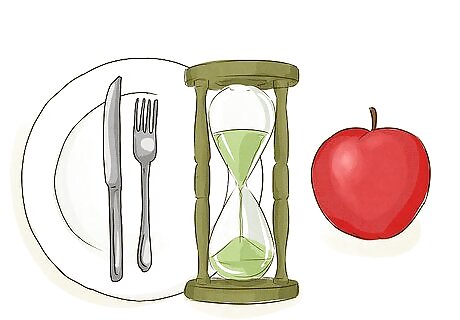
views
Keep your pact private between you and God.

This proves your loyalty and devotion to Your Lord. Make sure your promise to fast is sincere and special—let it be a private and spiritual matter that only God knows about. Refrain from posting about it on social media or telling your friends about it. Instead, close your eyes and concentrate on your intent or write down your agreement to fast in a private document, like a diary. Maintain a casual attitude around everyone else to keep your fast discreet: “That thou appear not unto men to fast, but unto thy Father which is in secret: and thy Father, which seeth in secret…” (Matthew 6:18). When you fast, you humble yourself and devote yourself completely to God. Use this time to tell the Lord that your primary focus is prayer.
Express the breakthrough you want.

Speak clearly about your wish and focus your heart on one goal. While God sees all and knows what you long for, the Lord wants you to get deeply in touch with yourself and your true spiritual desires. First, determine what you’re most hopeful for—such as an internal breakthrough or a life transition—and make a powerful statement to tell the Lord that you know what will fulfill you. Remind yourself what you’re searching for with words like: “As your humble servant, I ask for your support in renewing my faith and bringing me back to you, my Lord.” “Please grant me the wisdom to resist temptation and follow a righteous path, Dear Father God.” “Jesus, I pray for solace during these times. Please help me find a spouse who will support and cherish me.” “God, I ask for confidence and guidance. As your faithful follower, I am praying that you will direct me on the professional path that’s best for me.” “Lord, I believe in your divine plan. Will you please lead me to friends who will support my dreams?”
Identify the main obstacles in your life.

God wants to remove the walls that stand in your way. Confide in the Lord and reveal any temptations, inner demons, or barriers that you struggle with in life. Tell him that you will use your fast as an opportunity to guard yourself against earthly sins and doubts that test your faith. Identify stresses that require God’s support and determine what you need to resist with a message like: “I struggle with self-doubt and am tempted to push people away. Will you please help me resist shutting the world out so I can find love?” “I am troubled with anxiety. Can you keep me from surrendering to my insecurities so I can be my best self?” “I feel that I need to accept anyone who walks into my life, even if they’re not good for me. Will you help me avoid people who can harm me so I can find true allies?” While the pull of temptations or fear may feel strong, know that the Lord will guide you away from these influences: “And God is faithful; he will not let you be tempted beyond what you can bear. But when you are tempted, he will also provide a way out so that you can endure it” (1 Corinthians 10:13).
Decide what you’ll fast from.

Abstaining from food is not the only way to show your devotion. Decide what sacrifice will help you feel closer to God. Your heart might tell you not to eat for a period of time, or you may believe that the Lord wants you to resist a different temptation or pleasure, such as social media or alcohol. Refrain from the one activity that is most likely to distract you from praying or feeling spiritually pure. A “soul fast” is one in which you give up an activity that takes up a lot of time, like video games. When you start a “soul fast,” you’ll be able to shift your focus away from fun hobbies and toward God. A “soul” fast is less about “giving up” pleasures and more connected to returning to your spiritual path: “I humbled my soul with fasting; and my prayer returned into mine own bosom” (Psalm 35:13).
Determine how long your fast will be.

Give the Lord a specific time frame for your sacrifice. Choose from a "total" fast, a "selective" fast, or "time of day" fast. In most cases, a “total” fast is limited to 3 days—during this time, you do not eat any food. A “selective” fast involves giving up one type of food, like meat, for a set period of time, such as a week. A “time of day” fast, also known as an “intermittent” fast, requires you to not eat during daylight hours. Commit to one particular fast and clarify your vow to God. Consult your doctor before making any dietary decisions about your fast. You can still drink water during a “total” fast and should remain well hydrated during any fast. One example of a “selective” fast is the “Daniel Fast”—you remove bread, sweets, and meat from your diet. Remember that Daniel chose to give up the foods and drinks that gave him the most earthly pleasure: “In those days I, Daniel, was mourning three full weeks. I ate no pleasant food, no meat or wine came into my mouth…” (Daniel 10:2-3).
Make time for prayer every day during your fast.

Your fast helps you avoid temptations so you can connect with God. Find a quiet place without any distractions, such as a prayer room, where you can meditate and speak with the Lord. Choose a special time of the day, such as right in the morning or before you go to bed, when you can devote all your focus to God. Repeat an intention and express gratitude for the Lord’s divine intervention. Start by calling out to God. For example, say, “Lord, I give you my complete and undivided attention. I open my heart to you.” Repeat your intention. For instance, you might ask, “I am reaching out again so I can find the bravery to follow my artistic passions.” End my thanking the Lord for the gift that’s in store for you. Express yourself with a comment like, “I know that you know what’s best for me and will lead me toward that.”
List Bible verses that keep your spirit strong.

Scripture allows the Lord to comfort and guide you. Open up your Bible during the times that you usually eat or engage in an activity like watching television. Turn to a random page and record the lines of scripture that call out to you the most, or go straight to a passage you find the most inspiring, such as Matthew 6:16-18 (NIV), which reminds you not to look “somber,” or sad, as you fast. When you focus on the inspiring lines of the Bible and write them down, the Word of God will energize you. Since fasting allows you to open your heart up to God’s power, Bible verses may move you even more than they usually do. During this time, you may discover verses that you’ll continue to turn to after you end your fast.
Journal during your entire fast.

Your heart and mind will be clear so you can channel God’s divine message. Every day, you can start with the same prayer request to strengthen your intention. Write down new hopes as they arise, as well. Include “devotionals,” which are any meditative thoughts related to the Lord and a divine plan you believe in. When you reflect deeply on what this period of time has revealed for you, God sees that you’re completely invested in your fast. Once you’ve written your devotionals, you can create daily diary entries that simply log what your day was like. You might notice your quality of life improves over the course of your fast thanks to God’s influence.
Ask for a sign or a message from God.

When you make this request, the Lord will communicate with you. Since your fast will keep your mind off of temptations and only on your spiritual journey, your heart will be open to the divine way that God speaks to you. Recognize that God may call out to you in different situations—during a dream, in the middle of a prayer, or through scripture, for instance—and thank the Lord for the reassurance you’ll receive. God won’t give you a direct “yes” or “no” answer—you’ll have to pray often, reflect on your wish, and observe the world around you. For example, if you want a sign that you’ll experience peace with your family, you may witness a beautiful dove outside when you visit your parents. The Lord inspires you to take action once you witness a sign: “It shall be when these signs come to you, do for yourself what the occasion requires, for God is with you” (1 Samuel 10:7).
Remain faithful to your promise to God.

Keep up your fast every day to express how much you need a breakthrough. If you can stay consistent during the entire time, then you’ll prove you’re a true spiritual warrior and servant of God who can take on any challenge as you prepare for the Lord’s answer. While it may be difficult to stay the course, you’ll be glad you did—you’ll realize how much discipline you have and experience God’s love for your sacrifice. You have more opportunities to express your love for the Lord if you fast each and every day that you agreed to. If you do miss a day or two, then it’s more important to continue with the rest of your fast—you’ll still highlight your dedication if you keep trying to complete your spiritual journey.
End your fast when God calls you to.

Either follow Biblical tradition or your own intuition. If you chose a specific fast, such as one that matches the week-long spiritual pilgrimage of Jericho, then conclude it when all other followers do. However, if you designed your own fast based on what you believed the Lord wanted, such as abstaining from wine for a month, you can stop when you agreed you would. If you feel divinely inspired to continue and it’s healthy to do so, you can extend the length of your fast. When you do break a fast from food, eat small meals to allow your body to adjust to solids again.
Look for God’s miracle.

The Lord will reward you for your dedication, so expect an amazing event. Whether this incredible breakthrough happens the day after your fast or months from now, it will change your life dramatically and be an expression of God’s love for you. Any challenges that troubled you will be cast aside by the Lord’s divine will, and your prayers will come true. Take heart in how powerful your worship is—with God on your side, you’re capable of anything. You may notice small signs from God at random points of your life. For example, if you asked for a change in scenery, a distant relative may give you a postcard with a gorgeous landscape on it. When you are granted the breakthrough you asked for, make time to thank the Lord for listening to your prayers. Miracles happen on God’s timeline and when you remain faithful. Take heart and focus on the Lord’s reassurance: “I am the LORD, the God of all humankind. Is anything too hard for me?” (Jeremiah 32:27).




















Comments
0 comment